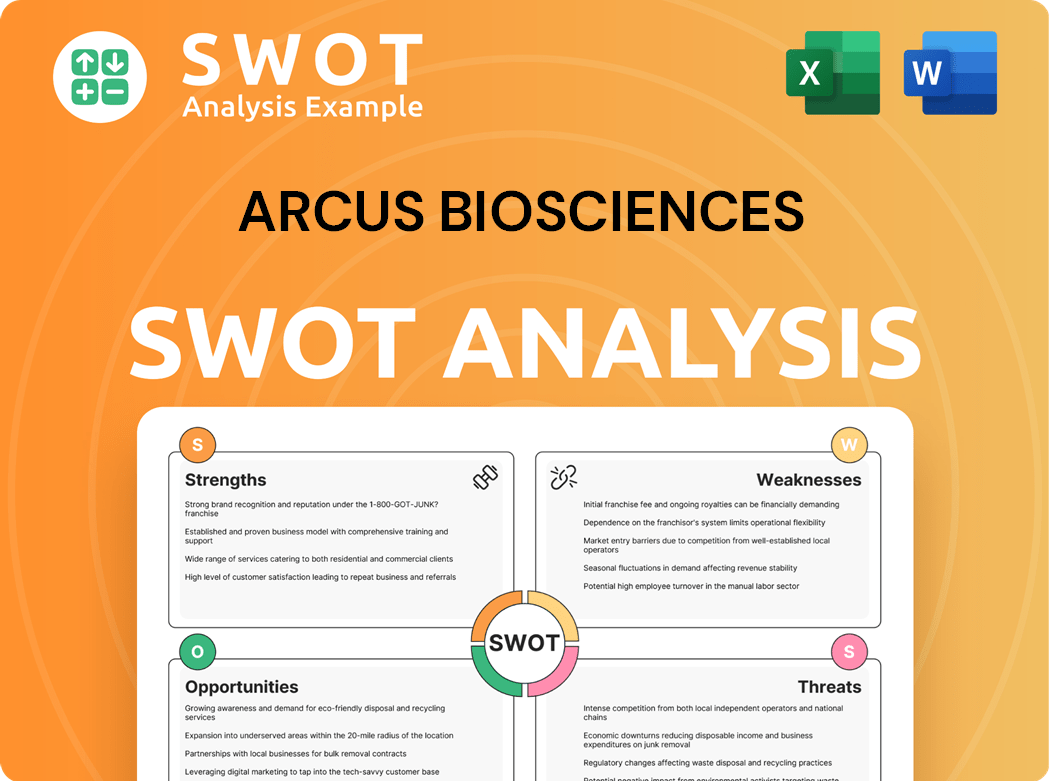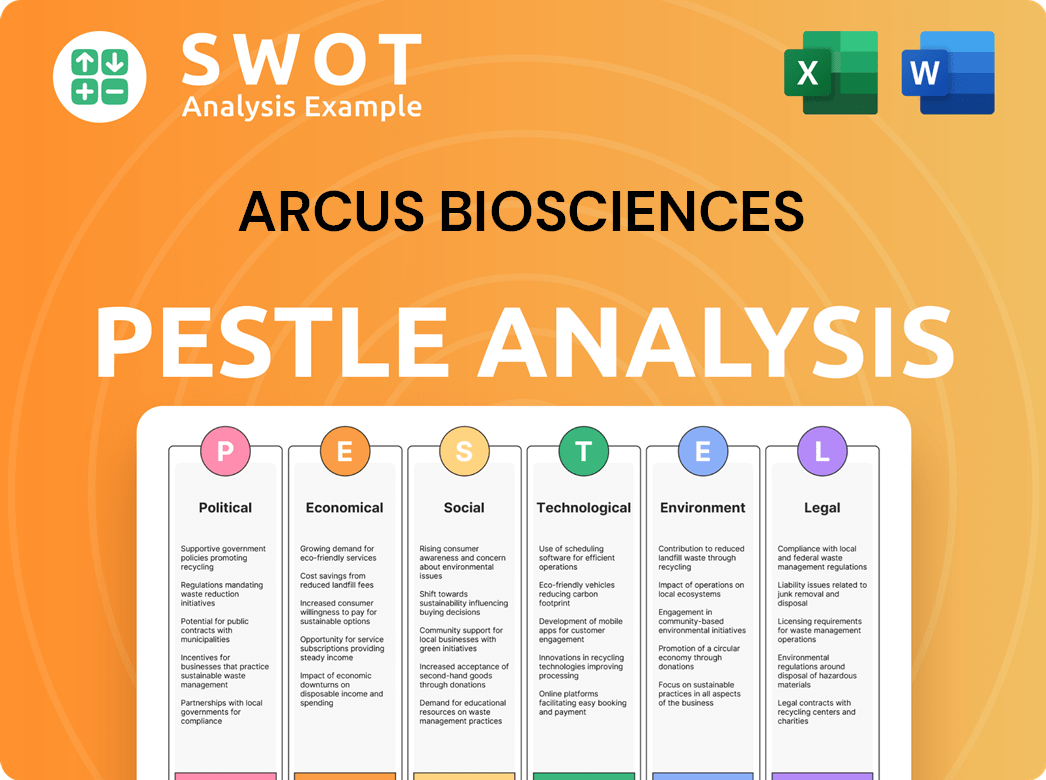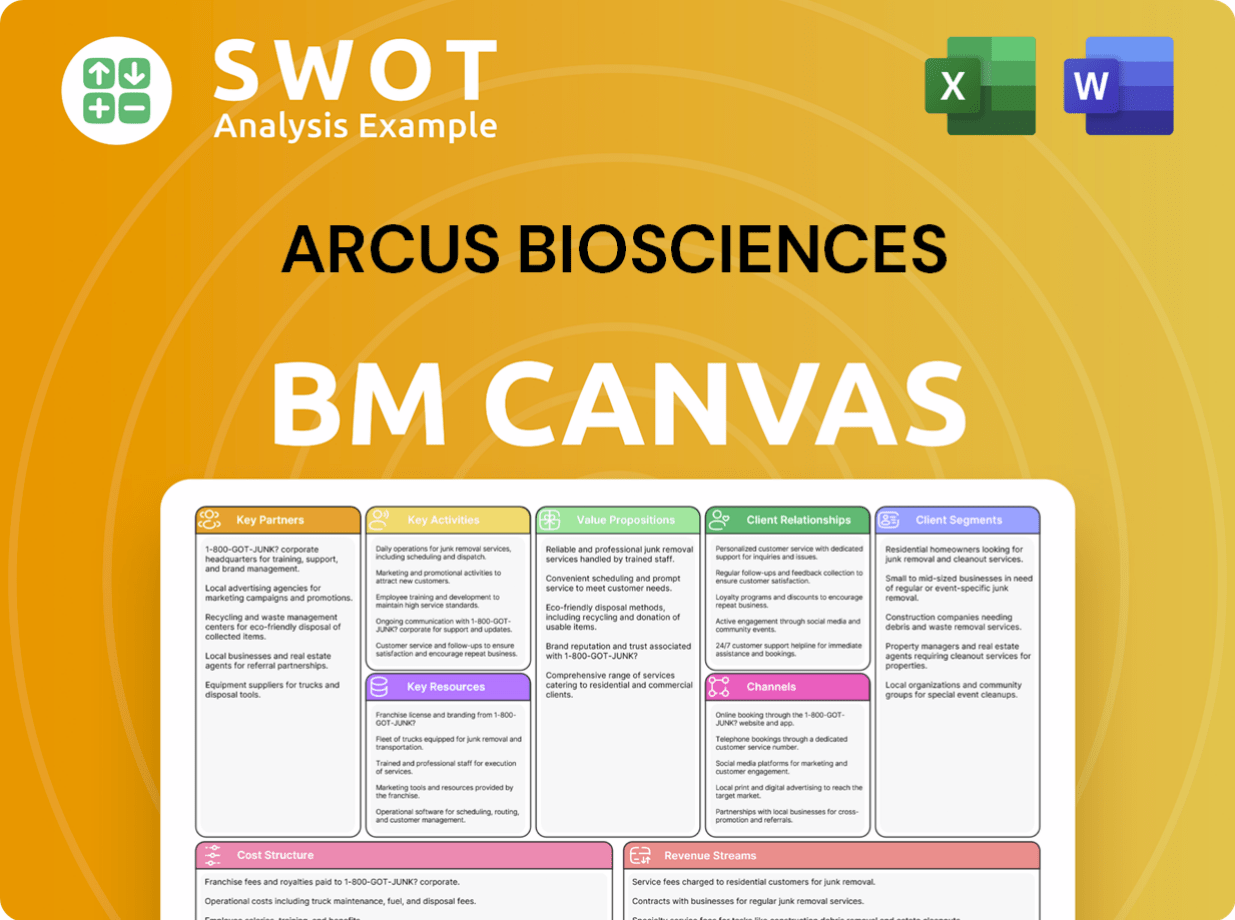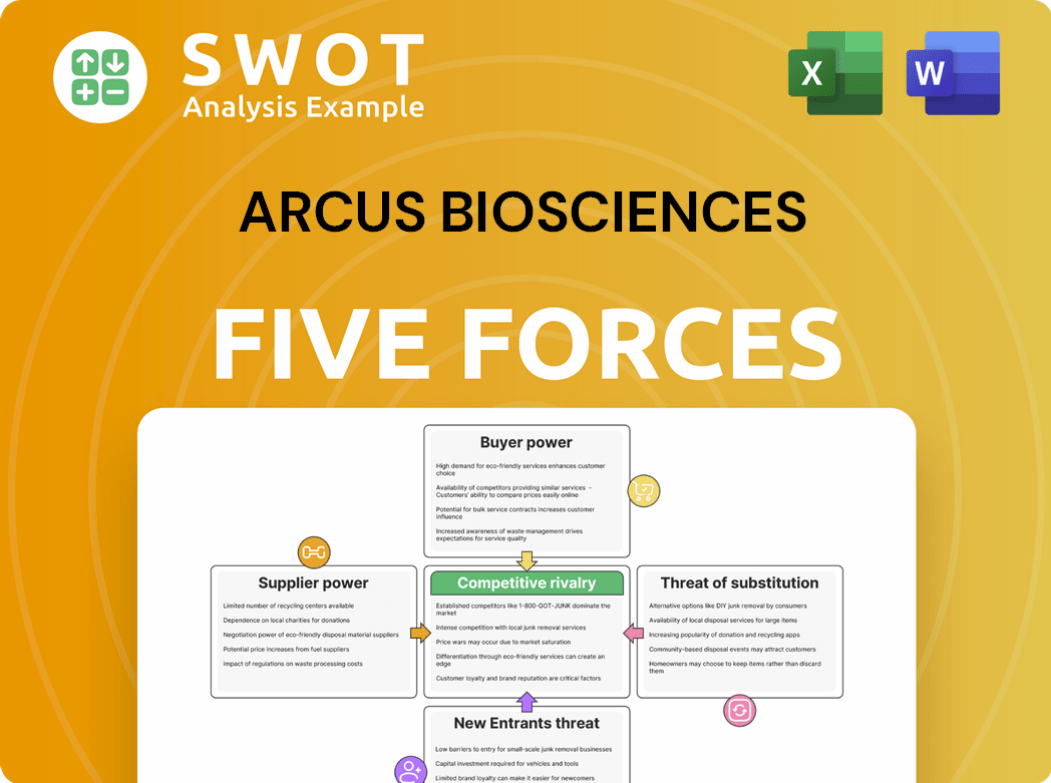Arcus Biosciences Bundle
How Does Arcus Biosciences Navigate the Fierce Biotech Arena?
The biotech industry, especially in oncology, is a battlefield of innovation. Arcus Biosciences, a key player in this arena, is developing cutting-edge cancer therapies. Founded in 2015, the company focuses on creating innovative immunotherapies. This Arcus Biosciences SWOT Analysis will help you understand its position.

Arcus Biosciences has rapidly grown from a startup to a recognized entity in the immunotherapy space. This growth reflects its robust pipeline of clinical-stage programs targeting various cancer mechanisms. This deep dive into the Arcus Biosciences competitive landscape will identify its rivals and highlight its differentiators within the biotech industry. We will explore the company analysis to understand its market share, and investment potential.
Where Does Arcus Biosciences’ Stand in the Current Market?
Arcus Biosciences operates within the dynamic and highly competitive immuno-oncology market. The company focuses on discovering, developing, and commercializing novel cancer therapies. Its primary goal is to enhance the body's immune response against cancer through innovative treatments, including small molecules and biologics.
The company's value proposition centers on its robust clinical pipeline, strategic partnerships, and strong financial health. Arcus Biosciences aims to provide differentiated cancer therapies with a particular emphasis on immunotherapy. This approach is designed to offer advanced treatment options for cancer patients, addressing unmet medical needs within the oncology sector.
Arcus Biosciences' geographic presence is mainly concentrated in the United States, given its headquarters in California and its clinical trial operations largely within North America. The company serves the customer segment of cancer patients through its development of novel therapeutic options. Over time, Arcus Biosciences has strategically shifted its positioning by forging significant collaborations with larger pharmaceutical companies, such as Gilead Sciences. This partnership, initiated in 2020 and expanded in 2021, involved a substantial upfront payment and equity investment from Gilead, indicating a strong validation of Arcus's pipeline and scientific approach.
As of Q4 2023, Arcus Biosciences reported cash, cash equivalents, and marketable securities of $693.3 million. This financial position, combined with $1.7 billion in non-dilutive funding from the Gilead collaboration, provides a strong financial runway to advance its clinical programs. This financial health allows Arcus to maintain a competitive edge in the biotech industry.
The collaboration with Gilead Sciences, initiated in 2020 and expanded in 2021, is a key element of Arcus Biosciences' strategy. This partnership has provided substantial financial backing and validated Arcus's research and development efforts. These collaborations are crucial for navigating the complex landscape of drug development.
Arcus Biosciences has a robust clinical pipeline with a focus on immuno-oncology. The company's product lines include various programs in clinical development. These programs are designed to target different mechanisms to enhance the body's immune response against cancer. For more insights, consider exploring the Marketing Strategy of Arcus Biosciences.
The competitive landscape in the biotech industry is intense, with numerous companies vying for market share in drug development. Arcus Biosciences faces competition from both large pharmaceutical companies and other biotech firms. The company's ability to differentiate its therapies and secure strategic partnerships is critical for its success.
Arcus Biosciences holds a strong position in the clinical development of next-generation immuno-oncology therapies. The company's focus on areas like adenosine pathway inhibition and TIGIT antagonists, along with its strategic partnerships, positions it favorably. Arcus's financial health, bolstered by collaborations, provides a significant advantage in the competitive biotech market.
- Strong financial runway with substantial cash reserves and non-dilutive funding.
- Focus on innovative immuno-oncology therapies targeting key pathways.
- Strategic partnerships with larger pharmaceutical companies, validating its pipeline.
- Competitive in the clinical development of next-generation immuno-oncology therapies.
Arcus Biosciences SWOT Analysis
- Complete SWOT Breakdown
- Fully Customizable
- Editable in Excel & Word
- Professional Formatting
- Investor-Ready Format

Who Are the Main Competitors Challenging Arcus Biosciences?
The competitive landscape for Arcus Biosciences is primarily defined by its focus on immuno-oncology and the biotech industry. Arcus Biosciences faces significant competition from both established pharmaceutical giants and other emerging biotech companies. Understanding this competitive environment is crucial for a thorough company analysis and assessing its potential for drug development and market share.
The biotech industry is characterized by high stakes, with clinical trials and drug development playing a central role. Arcus Biosciences's success hinges on its ability to navigate this complex landscape, differentiating itself through its pipeline drugs and strategic partnerships. The company's financial performance and recent news are closely watched by investors, influencing its stock price and overall investment potential.
Arcus Biosciences operates within a dynamic competitive landscape, particularly in the field of oncology, where immunotherapy is a key focus. Many companies are developing and commercializing cancer therapies, creating a competitive environment. A detailed look at Arcus Biosciences; key competitors reveals the challenges and opportunities the company faces.
Major pharmaceutical companies represent Arcus Biosciences's most formidable competitors. These companies possess substantial resources, extensive R&D capabilities, and established commercial infrastructures. For example, Merck & Co. (with Keytruda) and Bristol Myers Squibb (with Opdivo and Yervoy) have a significant market presence.
Arcus Biosciences also competes with other biotech companies focused on novel immunotherapy approaches. These competitors often specialize in specific pathways or technologies, potentially bringing disruptive innovations to market. Gilead Sciences and Genentech are among the key players in this category.
Clinical trial readouts are critical events that significantly impact stock valuations and market perception. Positive data can boost a company's prospects, while negative results can lead to setbacks. The competitive landscape for TIGIT inhibitors, for example, has seen various companies racing to demonstrate superior efficacy.
Mergers and acquisitions significantly influence the competitive dynamics within the biotech industry. Large pharmaceutical companies often acquire promising smaller biotechs to bolster their pipelines. This can directly challenge Arcus Biosciences's development programs. The impact of partnerships and collaborations is also significant.
Arcus Biosciences; financial performance and its ability to secure funding are critical. The company's stock price reflects market sentiment and its progress in clinical trials. Investors closely monitor the company's research and development efforts, as well as its partnerships and collaborations. For a detailed view, explore Revenue Streams & Business Model of Arcus Biosciences.
A SWOT analysis is useful for understanding Arcus Biosciences's position. Its competitive advantages might include innovative drug candidates or strategic partnerships. The company's oncology focus and immunotherapy landscape offer both opportunities and challenges. Understanding the competitive landscape is key to assessing Arcus Biosciences; investment potential.
Arcus Biosciences faces the challenge of competing with well-established companies with deep pockets and extensive market presence. However, the company also has opportunities to leverage its focus on novel immunotherapy approaches and strategic partnerships. The biotech industry is highly competitive, and success depends on innovation, clinical trial outcomes, and effective commercialization strategies.
- Financial Resources: Larger companies can outspend Arcus in R&D and commercialization.
- Innovation: Smaller biotechs may bring disruptive technologies to market.
- Clinical Trial Outcomes: Positive or negative data significantly impacts stock valuations.
- Strategic Alliances: Partnerships can enhance development and commercialization efforts.
Arcus Biosciences PESTLE Analysis
- Covers All 6 PESTLE Categories
- No Research Needed – Save Hours of Work
- Built by Experts, Trusted by Consultants
- Instant Download, Ready to Use
- 100% Editable, Fully Customizable

What Gives Arcus Biosciences a Competitive Edge Over Its Rivals?
Analyzing the competitive landscape of Arcus Biosciences reveals key strengths that set it apart in the biotech industry. Arcus's strategic focus on developing differentiated molecules and its robust pipeline of internally discovered assets are crucial for its company analysis. The company's partnerships, especially the collaboration with Gilead Sciences, provide significant financial and operational advantages, fueling its growth and development.
Arcus Biosciences's competitive edge stems from its proprietary drug discovery platform, which enables the in-house development of novel assets. This approach provides a strong foundation for intellectual property and reduces reliance on external licensing. Furthermore, the company's focus on combination therapies positions it well to address unmet needs in oncology. These strategies have evolved from a pure discovery-based model to one that strategically partners to maximize the potential of its assets.
Arcus Biosciences's financial health and strategic partnerships are pivotal to its competitive standing. The collaboration with Gilead Sciences, initiated in 2020 and expanded in 2021, has provided substantial non-dilutive funding. As of December 31, 2023, Arcus had received $1.7 billion in non-dilutive funding from Gilead, significantly de-risking its financial position. This financial backing enables the company to advance its clinical programs and leverage Gilead's expertise in regulatory pathways and large-scale clinical trials.
Arcus Biosciences's proprietary platform focuses on developing differentiated molecules, including small molecules and biologics. This platform supports the creation of novel therapies targeting specific mechanisms within the tumor microenvironment. The in-house discovery and development of assets provide a strong intellectual property foundation.
The partnership with Gilead Sciences offers substantial non-dilutive funding and access to global development and commercialization capabilities. This collaboration de-risks Arcus's financial position and accelerates its clinical programs. The co-development and co-commercialization aspects allow Arcus to retain significant participation in its programs.
Arcus Biosciences emphasizes combination therapies, exploring novel combinations of its assets with established therapies. This approach is designed to address unmet needs in oncology by leveraging synergistic effects. This strategy enhances the potential for improved patient outcomes and market differentiation.
The company's in-house discovery platform enables the creation of a strong intellectual property portfolio. This portfolio protects its novel assets and provides a competitive advantage in the market. The intellectual property is a key factor in Arcus's long-term growth and sustainability.
Arcus Biosciences's competitive advantages are rooted in its scientific expertise, strategic partnerships, and focus on innovative therapies. These advantages are critical in navigating the competitive landscape of the biotech industry. The company's ability to discover and develop novel assets in-house, combined with its strategic collaborations, positions it well for future success.
- Proprietary drug discovery platform for differentiated molecules.
- Strategic partnership with Gilead Sciences for funding and commercialization.
- Focus on combination therapies to address unmet needs in oncology.
- Strong intellectual property portfolio to protect novel assets.
For more detailed insights into the ownership structure and financial aspects of Arcus Biosciences, you can explore the information provided in Owners & Shareholders of Arcus Biosciences.
Arcus Biosciences Business Model Canvas
- Complete 9-Block Business Model Canvas
- Effortlessly Communicate Your Business Strategy
- Investor-Ready BMC Format
- 100% Editable and Customizable
- Clear and Structured Layout

What Industry Trends Are Reshaping Arcus Biosciences’s Competitive Landscape?
The biopharmaceutical industry, particularly the oncology sector, is experiencing significant shifts that influence companies like Arcus Biosciences. Technological advancements, such as genomics and artificial intelligence, are accelerating drug discovery. Regulatory changes, including expedited review pathways, impact market access. Consumer preferences are also evolving toward personalized medicine, driving demand for innovative therapies. These trends shape the competitive landscape and the future outlook for Arcus Biosciences.
For Arcus Biosciences, the competitive landscape involves both challenges and opportunities. The increasing sophistication of drug discovery platforms leads to more market entrants. Regulatory scrutiny on drug pricing could impact revenue. Conversely, advancements in cancer biology and the immune system create opportunities for targeted therapies. Combination therapies, a focus for Arcus, present growth prospects, as does the global increase in cancer cases. Strategic partnerships, such as the one with Gilead Sciences, are crucial for capitalizing on these opportunities.
The biotech industry is driven by technological advancements and regulatory changes. Genomics, proteomics, and AI accelerate drug discovery. Expedited review pathways and demand for personalized medicine are also significant. These trends impact the development and commercialization of therapies.
Increased competition from new market entrants poses a challenge. Regulatory scrutiny on drug pricing and market access may impact revenue. Clinical trial success and effective pipeline management are critical. Adapting to the evolving competitive and regulatory landscape is essential for survival and growth.
Advancements in cancer biology and immunology create opportunities for targeted therapies. Combination therapies, a key focus for Arcus, offer growth potential. The increasing global burden of cancer ensures continuous demand. Strategic partnerships, like the one with Gilead Sciences, provide support for pipeline advancement.
Arcus Biosciences must focus on successful clinical trials and effective pipeline management. Expanding collaborations and forming new partnerships can broaden its therapeutic reach. Selective acquisitions could also enhance its market position. These strategies are vital for sustained growth.
The competitive landscape for Arcus Biosciences is intense, particularly in areas like TIGIT inhibitors. Several companies are vying for market share, and clinical trial outcomes are crucial. Arcus's focus on combination therapies and its partnership with Gilead Sciences are key differentiators in the Brief History of Arcus Biosciences.
- Competition: Numerous companies are developing TIGIT inhibitors, creating a crowded market.
- Partnerships: The collaboration with Gilead Sciences provides financial and infrastructural support.
- Pipeline: Arcus has several drug candidates in clinical trials, targeting various cancers.
- Market Trends: Personalized medicine and combination therapies are increasingly important.
Arcus Biosciences Porter's Five Forces Analysis
- Covers All 5 Competitive Forces in Detail
- Structured for Consultants, Students, and Founders
- 100% Editable in Microsoft Word & Excel
- Instant Digital Download – Use Immediately
- Compatible with Mac & PC – Fully Unlocked

Related Blogs
- What are Mission Vision & Core Values of Arcus Biosciences Company?
- What is Growth Strategy and Future Prospects of Arcus Biosciences Company?
- How Does Arcus Biosciences Company Work?
- What is Sales and Marketing Strategy of Arcus Biosciences Company?
- What is Brief History of Arcus Biosciences Company?
- Who Owns Arcus Biosciences Company?
- What is Customer Demographics and Target Market of Arcus Biosciences Company?
Disclaimer
All information, articles, and product details provided on this website are for general informational and educational purposes only. We do not claim any ownership over, nor do we intend to infringe upon, any trademarks, copyrights, logos, brand names, or other intellectual property mentioned or depicted on this site. Such intellectual property remains the property of its respective owners, and any references here are made solely for identification or informational purposes, without implying any affiliation, endorsement, or partnership.
We make no representations or warranties, express or implied, regarding the accuracy, completeness, or suitability of any content or products presented. Nothing on this website should be construed as legal, tax, investment, financial, medical, or other professional advice. In addition, no part of this site—including articles or product references—constitutes a solicitation, recommendation, endorsement, advertisement, or offer to buy or sell any securities, franchises, or other financial instruments, particularly in jurisdictions where such activity would be unlawful.
All content is of a general nature and may not address the specific circumstances of any individual or entity. It is not a substitute for professional advice or services. Any actions you take based on the information provided here are strictly at your own risk. You accept full responsibility for any decisions or outcomes arising from your use of this website and agree to release us from any liability in connection with your use of, or reliance upon, the content or products found herein.